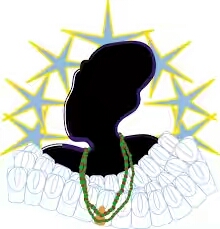Who is an Apetebi? : Her dos and don'ts
In Ifa, there are specific roles that had been prescribed for an apetebi to ensure the development of home, the community, and the nation as a whole in line with the dictates of Olodumare.
According to Ifa, an apetebi is the wife of Ifa, and not necessarily, the wife of a Babalawo or an ifa practitioner. A woman may be advised to have the symbol of Ifa on her person in order to solve a specific problem in life or to accelerate to the realization of certain goals for her while the husband may not be an Ifa practitioner at all.
However, this can only be done with the consent of the husband.
Furthermore, all the wives of Ifa followers, priests, and officials are Apetebi. The importance of this explanation, therefore, is to drive home the fact that apetebi is not an exclusive name of only Babalawos' wives.
Dos and Don'ts
The first and one of the most important functions of an Apetebi is to clean her home and environment regularly and at the same time, take care of Ifa shrine, Ifa plates, and other utensils every "Ose Ifa day". Ose Ifa is observed once in every five Yoruba days. Ifa says by doing this, all the good things of life the Apetebi lacks shall be given unto her with ease.
An Apetebi must also have respect for her husband and show good manners at all times. Ifa says that by so doing, she will receive the blessings of her husband and as a bonus, there will be understanding and mutual love between her and her husband. Her husband will also respect her and her concerns.
An Apetebi is expected to be a role model for other women. She must be watching her utterances and deeds at all times. She must not use her utterances to cause trouble for herself or her husband. For example, an Apetebi must never be a gossip.
An Apetebi must also respect herself and her family, she must never engage in any form of infidelity or extramarital activity. Ifa is vehemently and totally against this.
For this reason, therefore, an Apetebi must never be found doing this. The penalty is just too severe.
An Apetebi must always remember too that she is Ifa's wife primarily and merely by extension, the wife of the Babalawo. Anything done wrong is against Ifa and it shall be judge by Ifa.
As an Apetebi, there is nothing secret we can do that Ifa is not aware of. In this wise, we must always strive to be good at all times. We must always display fidelity openly and in secret at all times.
When an Apetebi is blessed with children she must strive to take care of them. Olodumare endows women with the capacity to take care of the home and children better than men.
An Apetebi must bear in mind at all times that no matter how great a man may be, he is begotten by a man and he received his primary socialization from a woman like you and me. On this wise, therefore, Apetebi must endeavor to give our children the best of training.
On a final note, Ifa rewards any Apetebi
who complies with its tenets with abundant blessings prosperity and protection against evil forces. Conversely, an Apetebi who violates Ifa's tenets shall be adequately and commensurably punished.
Apetebi all over the world should always observe Ifa rules and regulations and abide by them so as to have happy marital lives and a fulfilling wife as well.






You should write an article on how a Babalawo should behave because most Babalawo are corrupt and abusive towards women. Babalawo don't bless women, Babalawo are blessed by the mothers that gave birth to them! It is the Babalawo that's giving bad reputation to Isese, not the women!
ReplyDeletePerhaps you should write it.
Delete😂😂😂😂😂
DeleteWell said about an apetebi.. at the end of the day you have to have respect for the babalawo. Remember a well mannered apetepi never goes unnoticed. You still get blessings regardless of how a man treats you. As long as you do your part respect your self your children and the spouse your good. Everyone has punishment one way or the other it's called karma.. let the saints deal with it.. no more gossiping about it..
ReplyDeleteBlessings best regards omo oddua
iboru iboya ibocheche
I really enjoyed this passage as well as the comments.
ReplyDeleteThank you for this message.
ReplyDelete